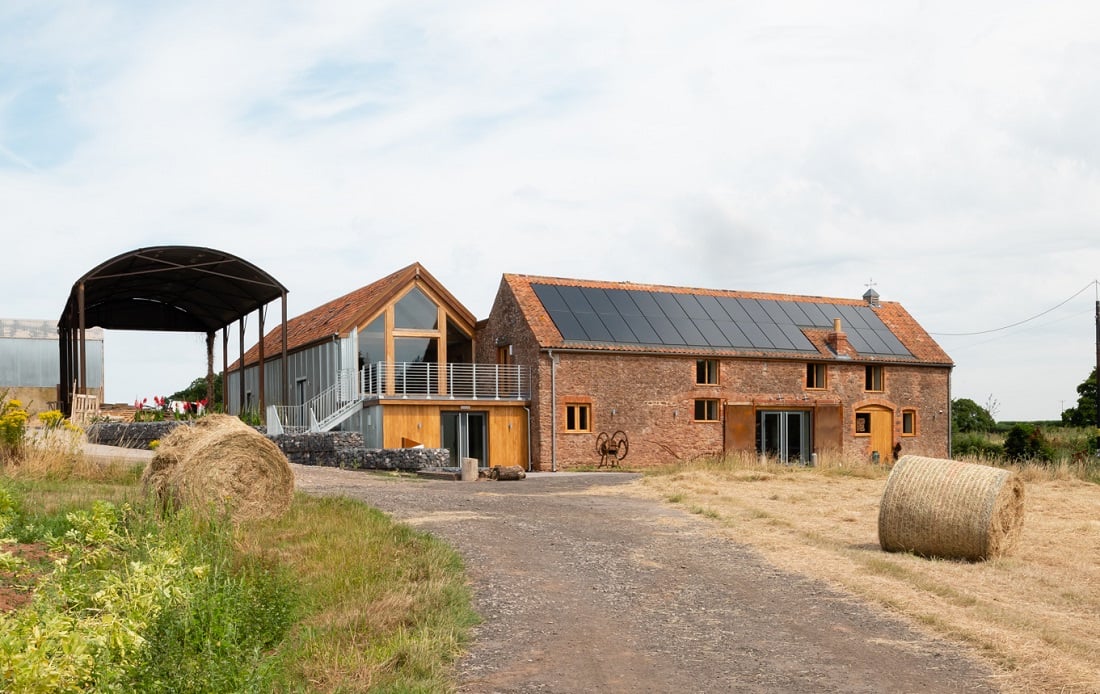
Photo: Jim Stephenson photography
Why lockdown works for rural arts
Deborah and Michael Parkes say lockdown presents challenges to budding rural artists. It also gives them an abundance of two things they once lacked – connectivity and time.
Clayhill Arts is a residential learning space for artists and creative professionals based at a converted farm in rural Somerset. We decided to build somewhere that specialised in offering professional training for arts practitioners by bringing artists together with the people they want to learn from. Focusing on supporting emerging artists in the region, we have worked closely with local organisations such as Somerset Art Works and Forest of Imagination to support artists and provide them with time and space to develop and reflect.
Adapting to change
2020 was meant to be the year that our course programme was due to launch in full, but, as with so many things this year, we had to put that on pause. Our physical facilities closed and courses postponed. We had to adapt quickly to the current climate and be imaginative about what this would involve. Initially we moved courses online and hosted a summer school, Thriving and Surviving as an Artist. Artists from across the UK and Europe attended a five-week programme to develop tools for resilient arts practice. Being online meant the course reached a much wider audience and allowed participants to network and share their thoughts on the time we find ourselves in. Kate Hastead, an artist on the course, said it enabled her to think about her arts practice from a more strategic perspective: “[It helped me] to think about how I engage with people I am coming into contact with, which was interesting for me to have time to reflect on.”
Although we had previously considered holding online courses, the pandemic forced us to move online earlier than planned. We have now realised the potential this offers us to reach out globally, and we’re planning more online learning in the future.
We used our time during lockdown to continue growing our online audience, producing an in-house podcast In The Studio, which explores the personal journeys of our tutors and discusses how to best navigate the challenges of a career in the arts. Online activity was prompting reflection and conversation, but it still felt important for us to provide something in ‘real life’ when it was safe to do so. We tentatively re-opened in September, delivering a series of bi-weekly life drawing sessions and Back to Basics, a programme of one day workshops on the fundamentals of arts practice. These sessions were created for the local arts community, creating a safe space that is open, welcoming, supportive, and non-judgemental – a place to come together and connect again.
Rural drawcards – and drawbacks
Social distancing has been less of a challenge for us as our location in rural Somerset is naturally isolated by the surrounding environment. One of our aims as a rural business is to highlight the importance of connecting with nature, especially during the pandemic. Being out in nature gives you more time to think, contextualise your practice, and reflect on your impact on the environment. However, being rurally based has its challenges: lack of footfall, limited access to services, and the difficulties of trying to entice visitors to a remote business have all proved tricky.
Poor internet connectivity in the South West region has also been challenging; this is felt in rural locations across the UK. Early attempts to move courses online were hampered by slow internet speeds and on one occasion a complete loss of connection when a local farmer cut the line! We initially considered renting our on-site accommodation as office space for people looking for a safe alternative to having to work from home. Our en-suite rooms are ideal for individual use because they are isolated from the rest of the building. Unfortunately, the poor internet access made this unviable.
Physical/Digital
With our spacious, remote and Covid-secure facilities, we feel we are ready to safely welcome back visitors to attend workshops, courses and events next year. Our 2021 programme responds directly to the events of this year with an overarching theme of ‘Physical/Digital’. As a result of the Coronavirus crisis, and the general acceleration of digitally-focused living, we want to offer courses throughout the year that reflect on the positives we have taken from this time – and what we need to get back to. We are currently planning an online launch event for March that includes an artist-in-residence responding to the site, guest speakers, and the release of our new quarterly magazine.
We have used the lockdown as an opportunity to do the things we simply never have time for. We recently completed a B Corp application and started work on our own cinema. Renovated from an old Dutch barn and built using reclaimed materials from around the farm, this will be part of the rural cinema network and show independent films for the local community. We hope to be able to open this to coincide with our spring programme.
Deborah and Michael Parkes are Co-founders of Clayhill Arts.
![]() clayhillarts.co.uk
clayhillarts.co.uk
![]() @ClayhillArts
@ClayhillArts
Join the Discussion
You must be logged in to post a comment.